
Years ago a friend wrote me a story about how we all started talking but in doing so, stopped listening to each other. It was a short and simple story, adapted I believe from its Aboriginal origins, that also explained how our ears developed their peculiar, conch-like shape.
Like all the best tales, it began: Once upon a time, in a land not-so-very-far-away, we were all connected to each other by a long umbilical loop that went ear-to-ear-to-ear-to-ear. This connection meant we could hear what each of us was thinking, and we could share our secrets, hopes and fears together at once
Then one day and for a whole lot of different reasons, these connections were broken, and the long umbilical loops dropped away, withered back, and creased into the folds of our ears. That’s how our ears got their shape. They are the one reminder of how we were once all connected to each other.
It was the idea of connection - only connect, said playwright Dennis Potter, by way of E. M. Forster, when explaining the function of all good television. A difficult enough thing, but we try. It’s what the best art does - tells a story, says something.
It’s what Rod Serling did. He made TV shows that have lived and grown with generations of viewers. Few can not have been moved to a sense of thrilling by the tinkling opening notes of The Twilight Zone. The music still fills me with that excitement I felt as a child, hopeful for thrills, entertainment and something a little stronger to mull upon, long after the credits rolled.
Serling was exceptional, and his writing brought a whole new approach to telling tales on television that connected the audience one-to-the-other. This documentary on Serling, starts like an episode of The Twilight Zone, and goes on to examine Serling’s life through the many series and dramas he wrote for TV and radio, revealing how much of his subject matter came from his own personal experience, views and politics. As Serling once remarked he was able to discuss controversial issues through science-fiction:
“I found that it was all right to have Martians saying things Democrats and Republicans could never say.”
His work influenced other shows (notably Star Trek), and although there were problems, due to the demands of advertisers, Serling kept faith with TV in the hope it could connect with its audience - educate, entertain and help improve the quality of life, through a shared ideals.
As writer Serling slowly “succumbed” to his art:
‘Writing is a demanding profession and a selfish one. And because it is selfish and demanding, because it is compulsive and exacting, I didn’t embrace it, I succumbed to it. In the beginning, there was a period of about 8 months when nothing happened. My diet consisted chiefly of black coffee and fingernails. I collected forty rejection slips in a row. On a writer’s way up, he meets a lot of people and in some rare cases there’s a person along the way, who happens to be around just when they’re needed. Perhaps just a moment of professional advice, or a boost to the ego when it’s been bent, cracked and pushed into the ground. Blanche Gaines was that person for me. I signed with her agency in 1950. Blanche kept me on a year, before I made my first sale. The sale came with trumpets and cheers. I don’t think that feeling will ever come again. The first sale - that’s the one that comes with magic.’
Like Richard Matheson, Philip K Dick, Stephen King, Ray Bradbury, Harlan Ellison, Serling is a hero who offered up the possible, for our consideration.